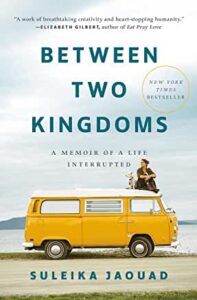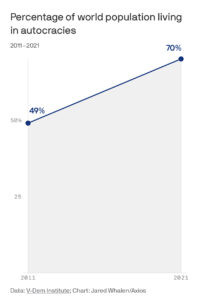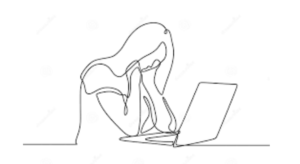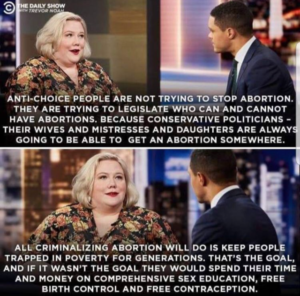Dan Rather/Steady
Thursday, March 31, 2022
March 31, 2022’60-65% of all the cells in the heart are neural cells, which function in the same way as brain cells.’
A global shift is under way and more people are sensing it involves a deeper connection with their heart. This desire for more heart connection is a growing movement, one that people are drawn to by a nudge from their own intuition or conscience to listen to their heart more and to connect with their inner guidance. -Heart Math
100 Days of Creativity with Suleika Jaouad begins tomorrow, April 1st
‘Here, as I’m undergoing my second bout of cancer treatment for leukemia, I’ve decided to do a 100-day creativity project beginning on April 1, 2022, and I’m inviting all you beautiful souls to join me.
This is my fourth go-round. To me, the 100-day project is so powerful, both the sense of creative possibility and the organizing principle it affords: your day becomes centered around one small creative act. I also love the element of community, drawing inspiration and a sense of accountability from others.
There are so many shapes such a project can take—from writing a daily childhood memory to collaging, piano playing, or walking in nature. It just needs to feel exciting, a little challenging, but most of all sustainable, so you’re able to keep it up over the course of 100 days.
As someone who feels pulled by the siren call of hyper-productivity, I want to make clear: the 100-day project is not that. The point is to get into a more liberated, playful creative flow state—not to reinforce the pressure of constant striving, or the compulsion to be productive, or the idea that creative activity needs to culminate in some kind of grand masterpiece.
This time around, the 100-day project will be mostly self-directed. For those who want an extra dose of accountability, paid subscribers will have the option of getting regular pep talks from me, along with check-ins and opportunities to have your work featured.
Below you’ll find some frequently asked questions and my answers—all with the caveat that this practice is for you. Make it your own. Let it take you where it will.
In love and creative solidarity,
Suleika’
Her book, Lost Between Two Kingdoms, is now available in paperback. Wonderful read and journey. -dayle
AXIOS
Democracy is good for your health
Here’s a big reason to study the people of Ukraine: The war is showing in real-time the power of democracy, amid growing global clout for dictators.
Why it matters: Free people live better lives, a mountain of data shows. And sometimes it takes an aspiring democracy to remind us why governments of the people are worth fighting for.
Let the graphic above sink in — then share it with people who trivialize democratic erosion. Democracies are literally disappearing.
Of 195 nations on earth, just 34 are liberal democracies — where citizens have rights to free speech, free press, free and fair elections, and other liberties — according to a study by Varieties of Democracy.
Living in a stable democracy leads to a longer and more fulfilling life, the data shows:
Health: If you live in a democracy that’s at least 25 years old, you’re likely to live 14 years longer than people in autocracies, a University of British Columbia study found. Babies in mature democracies are 78% less likely to die in childbirth.
Wealth: Democratization boosts a nation’s wealth 20% over 25 years.
Education: Democratization bumps citizens’ enrollment in secondary education by 70%.
Reality check: After nuclear war, and possibly climate changes, the rise of authoritarians, like Vladimir Putin, and the decline of democracies has the most potential to shape America’s future — more profoundly than the small-ball fights we often get sucked into.
The dictators are winning. A Russian dictator, backed by an authoritarian Chinese leader and enabled by the silence of the Saudis, is killing thousands, seizing land, destroying a nation.
A Freedom House report released in February found that 60 countries had suffered declines in democracy in the previous year.
The bottom line: American critics sometimes dog — and in some cases damage — their democracy. But watching Ukrainians amplifies the preciousness and precariousness of freedom.
[Editor’s note: This article has been corrected to note that people living in democracies older than 25 years are likely to live longer.]
Glory to Ukraine ~ Their struggle, their sacrifice, is ours. -dayle
Julian of Norwich
‘She encourages us to stand up to the forces that destroy, forces she calls “the spirit of evil.”
The warrior in us can rise up, armed with trust and courage, to spread low and make justice and compassion happen. In doing this, a promise is set forth that, some day, all can be well.
“All shall be well, and all shall be well and all manner of thing shall be well.” ❁
-Julian of Norwich
‘The biggest influence on Julian as an adult were Thomas Aquinas and Meister Eckhart, whether directly or indirectly. Remember that Aquinas, who was condemned by bishops in both Oxford and Paris less than a century before Julian was born, was condemned for his non-dualism (which, again, makes him a photo-feminist). But, and this cannot be emphasized enough, he was canonized a saint in 1323, less than twenty years before she was born. The excitement among the Dominicans in England must have been extreme.
As Aquinas put it, one person can do more evil than all the other species put together.’ -Matthew Fox
Yep. Still. The 21st century is no different. -dayle
Power Path
New Moon in Aries is Friday April 1 at 12:24 AM, just after midnight March 31. In some time zones the New Moon is on March 31.
‘This is an extremely potent New Moon, full of fire, opportunity, and inspiration for starting something new. It marks the beginning of a new cycle and should be honored as the set up and foundation for new commitments, goals, confidence, clarity, change and attitude. We are called to action, to be better, to be more conscious and aligned with spirit. It’s a great time to revisit goals and intentions and either reset and confirm them as they are, or refine and improve them if they feel too limited.
A re-evaluation of your relationships especially your relationship to yourself and to spirit is also supported at this time. Are you doing the work? Are you committed to having a good life? Are you taking responsibility for it? Are you ready to embrace the power that awaits you and change all aspects of your story that point to disempowerment or being wronged in some way? This is a very good time to step into power and to do so takes being proactive and not reactive.
You cannot be ambivalent or in blame of others if you wish to be proactive and take advantage of what this time has to offer. Step into the grand adventure of life and receive the gifts of spirit that are available to those that do. Happy Spring. Happy planting of seeds, dreams and wishes.’ ☆
For the Bees
Steady-Newsletter
by Dan Rather, author and journalist
What I find so inspiring about this article and the larger No Mow May movement is its recognition that we humans are foolhardy to try to control nature — that in our homogenization of our landscapes, our search for tidiness and uniformity, we not only miss out on the beautiful wildness of Earth’s diversity, but we also do real damage to its function.
At Steady, we are always on the lookout for different kinds of news stories that inspire, provoke thought, and, yes, induce some hope and steadiness.
We came across just such an article recently in The New York Times. It was written by Anne Readel, who is described as “a photographer, writer, biologist and lawyer.” It’s quite the list of credentials and a reminder that many of us wear multiple professional and personal hats.
During an era of momentous events, this story could be considered “small” or “quaint,” but that scale of size is part of what makes it so powerful. I would argue that in a world that often seems out of balance, we can build progress from small individual actions that are transformative in their collective impact.
The article is titled, “In Wisconsin: Stowing Mowers, Pleasing Bees,” and it asks in its subtitle a question that pretty much explains its central idea: “Can the No Mow May movement help transform the traditional American lawn — a manicured carpet of grass — into something more ecologically beneficial?
‘Appleton became the first city in the United States to adopt No Mow May, with 435 homes registering to take part. For the last few years, Appleton has spearheaded the movement to save the bee by asking community members to leave their lawns alone during May.’
Lastly, on this final day of March 2022, sharing writer Alexandra Stoddard’s words of contemplation for our ‘next’ as democracies weaken, devastating wars continue, the ubiquitous plague waves in and out, and global corruption, i.e., greed, power, and patriarchy, corrodes even the simplest of lives.
When do you feel you are most in touch with your spirit, the core of your being? Where are you? What are you doing? Who are you with? Who would you want to be with? How does this make you feel?
Marianne Williamson:
“We were all indoctrinated into a disenchanted world, and we’ve sacrificed a lot in order to live here. The world isn’t better off for having forfeited its tenderness. The meanness and cynicism of our age, the reflexive sarcasm that passes for intelligent reflection, the suspicion and judgment of everyone and everything – such are toxic by-products of a disenchanted worldview.
Many of us went off that wheel of suffering. We don’t want to accept that what is is what has to be. We want to pierce the veil of illusion that separates us from a world of infinite possibility. We want another kind of life for ourselves and for the world. We are considering that there might be another way – a door to miraculous realms simply waiting to be opened. Today I consider that there might be another way.”
“What you don’t surrender, the world strips away.” -Bruce
Private Morality
December 9, 2021“Another world is not only possible she is on her way. On a quiet day, I can hear her breathing.” -Arundhati Roy
Justice Ginsburg: “For one thing, we should appreciate the women on whose shoulders we stand, women who said the same things we said many years later, but we spoke at a time when society was willing to listen.”
Write to them. Share your story.
Supreme Court
1 First Street
NE Washington DC 20543
‘Abortion is not just about “a woman and her body.” It’s also about a woman and her God, her sense of what is right and wrong, a woman and her own internal compass, a woman and her life and how she is called to live it. When I heard a young woman on a panel describe an abortion as no bigger deal than a pap smear, I remember two things: 1) feeling nauseated, and 2) thinking, “This has gotten insane. We’re going to lose this.”
I am thoroughly pro-choice, but not because I don’t believe abortion is a moral issue. I’m pro-choice because I believe it’s an issue of private morality…’
A deeply reflective and personal essay about the right and devastation of ending a pregnancy, a woman’s decision and her private morality…her choice. ~dayle
Abortion In a New Light.
The Answer with a capital A.
by Marianne Williamson
“With the Mississippi abortion case now before the Supreme Court, it appears that reproductive rights in this country could very likely be severely curtailed.
I was a child when the Roe V. Wade decision legalized abortion in the United States. Becoming sexually active years later, I never knew a time when a woman couldn’t assume her right to an abortion should she choose to have one. My late teens and twenties were a time of tremendous feminist tumult – often referred to as “a war between the sexes” – and a woman’s right to control her reproductive destiny was a huge part of our newly forged freedom.
I can’t remember a sense of huge controversy around Roe v. Wade in the years first following the decision. It was only later that the topic became a roiling argument throughout the country, more and more people expressing passionate positions either pro or con. Generations of women grew up taking the right to an abortion for granted, with seemingly little understanding of how fragile a right can be when its disappearance is only one Supreme Court decision away. I’ve often been astonished by women who didn’t seem to realize the significance of their political choices in regard to this fundamental freedom. No matter how many times you’d remind someone during presidential campaign season, “But the Supreme Court! The Supreme Court!” there were always those – including young women who I assumed were sexually active – who’d roll their eyes as though it simply didn’t matter. Never having known a time when the choice wasn’t theirs, they seemingly couldn’t imagine a time when it wouldn’t be.
What is happening now, then, has been brewing for years. And strident voices on both sides of the argument made it inevitable. While I’ve always been committed to a woman’s right to choose, I’ve been disturbed over the years by how the issue has been contextualized on the political left. I saw it as problematical both morally and politically.
I was always told growing up that it’s not government’s role to legislate morality. There were issues of public morality and those of private morality; while ethical decisions should weigh heavily in public policy, “government should stay out of people’s bedroom,” as my father used to say. While as citizens we should care deeply about the moral dimension of political decisions, when it comes to an individual’s private choices – choice that had no one effect on “the common good” – then government should have no say whatsoever. I have never deviated from that belief.
I’ve always recognized a moral dimension to the issue of abortion, but to me it’s an issue of personal morality. Denying a woman the right to her own moral choices, as well as the choice of what she will do with her body, is government overreach and transgression upon her freedom, period. But a casual abortion is as much a moral anathema to me as it is to any rightwing conservative. And the vast majority of women I’ve known – including those who have had abortions – feel the same. Whether or not to terminate a pregnancy is a deeply painful decision, and one made by most women because of ethical considerations: the failure to be able to financially support a child, her relationship to the father, health considerations and so forth. It’s hard enough deciding whether or not to terminate a pregnancy; the last thing a woman needs is to have the government weighing in on her decision.
Yet any suggestion that abortion is a moral issue has been considered by many in the pro-choice movement to be a slippery slope that would lead to disastrous political results. I very much disagree, however; I think our failure to recognize its moral dimension is part of what has led to disaster. Our failure to put the issue of abortion within a moral context been a gift to the anti-choice movement.
Over the years, an overly secularized left became stridently amoral on the issue of abortion. This made me squirm, not only because I felt it was wrong but because I could see that it aroused a deep reaction in those whose social and political leanings were more conservative than mine. Over the years we began to lose the social consensus that abortion should be legal, in part because of those who kept continually trying to argue that in essence it’s no big deal.
But it is a big deal. Abortion is not just about “a woman and her body.” It’s also about a woman and her God, her sense of what is right and wrong, a woman and her own internal compass, a woman and her life and how she is called to live it.
When I heard a young woman on a panel describe an abortion as no bigger deal than a pap smear, I remember two things: 1) feeling nauseated, and 2) thinking, “This has gotten insane. We’re going to lose this.”
I am thoroughly pro-choice, but not because I don’t believe abortion is a moral issue. I’m pro-choice because I believe it’s an issue of private morality, and I trust the moral decision-making of the American woman. It’s a deeply personal decision for a woman whether to terminate a pregnancy, and government should have no right to make that decision for her. An additional moral issue is that repealing Roe v. Wade will simply mean rich women can continue to have safe abortions (they always did), while poor women will be relegated to the days of back alley, dangerous abortion procedures. Economic injustice is itself a moral issue.
As a political candidate I was told on various occasions by people with an anti-choice orientation that they would vote for me despite my pro-choice positions and my support for Roe v. Wade. “But you do agree it’s a moral issue, right?” they would say to me. “I just need to know that you see that.” It was a very easy promise for me to make.
Abortion is one of several areas where the refusal of those on the left to include the moral dimension of an argument in its analysis, much less how it was to publicly communicated, has diminished the moral authority of progressivism as well as its deeper connection to the hearts of our fellow citizens. Treating people of faith as though their consideration of issues is too unsophisticated to be taken seriously has had a deeply deleterious effect on American politics: it already has – and will continue to, if left uncorrected – begun to shrink the political base of progressivism. It is a serious surrender of moral authority, and a surrender of moral authority almost inevitably leads to a surrender of political authority. It’s no accident that year after year, in poll after poll, we’ve watched support for reproductive rights fall. Yet no one was allowed to say, “Perhaps we could reconsider our approach to this.” Nope. Such conversation was suppressed almost fanatically by the self-proclaimed arbiters of exactly how we were permitted to talk about Roe v. Wade.
[Marianne Williamson]
In A Course in Miracles it refers to the Answer with a capital A. That answer is not about which one of us is right; in a free society, no one gets to have a monopoly on the truth. Our political as well as our spiritual salvation lies in learning to speak, to think, and to respond from a much deeper place. Stark binary choices provide little opportunity for truly creative problem-solving, much less a miracle. We will continue to crash into walls both political and personal until we deepen the level of consciousness from which we approach our lives. Yet when we do, our lives will transform. Our politics will transform. And our world will transform.
The war over reproductive rights is a symptom of a deeper problem, and until we address the underlying issue of how we speak to each other and listen to each other, respect each other and honor what our hearts are saying, we will remain divided in ever more dangerous ways.
____________________________________
[From The Daily Show with Trevor Noah.]
Free child care, free early prekindergarten, free conception, and education. No, as Marianne cringed and became nauseous hearing abortion is like pap smear. Horribly, no. There are layers, often complex layers a woman has to hold to make a deeply morality based decision. If SCOTUS eliminates viability, abortion will instantly be nullified in at least 20 states, making abortions illegal after six weeks, of course most women often don’t know they’re pregnant until a number of weeks later.
The Supreme Court will present their final arguments and a decision some time next summer, June 2022. If the conservative judges who were placed on the bench for the sole purpose of overturning Roe, they have their votes. Privileged women will continue to find abortion sites, perhaps in other states, yet those women in poverty won’t be able to drive long distances to find a clinic that will assist them; if they do assist, doctors may be arrested on criminal charges. It will fundamentally change the country where abortion has been legal for generations.
I urge you to write to the Supreme Court, all women…all ages. Tell your stories, explain to them your private morality, what could or did happen to you, be it going forward with having the baby, or ending the pregnancy and why you made that decision. What were the social services needed that you didn’t receive, i.e., contraception, education, medical care.
Here’s the address again:
Supreme Court
1 First Street
NE Washington DC 20543
From former CBS news anchor/journalist Dan Rather:
The issue of abortion is one on which fair minded people, honest to their own beliefs and moral codes, can disagree. But today was not about personal choice. It was about the law of the land that will make no exceptions other than those carved out by the states. And if the history of a time before legal abortions is any guide, and there is no reason to suspect otherwise, today will beget many personal tragedies, ruined lives, hardship, and despair. -Essay from Dec. 2, 2021, “Steady.”
What is the end game? Why subvert individual rights, dilute voting rights, gerrymandering, billionaire favor? Historian and Harvard professor Jill Lepore weighs in with her thoughts on her latest Pushkin/BBC Series about Elon Musk, episode #5 of “The Evening Rocket.”

“It’s a weird thing about being a historian, everything reminds you of something else. […] ‘Muskism’ asks us always to picture the future, but I find it hard not to keep picturing the past, yanked back, lassoed by likenesses. […] The people with the most money shouldn’t get to decide what happens on earth, or on the moon, or in the skies, or on mars, or any where. To me the largest story about the rise of ‘Muskism’, extravagant extreme fantastic capitalism, is its anachronism. I can’t tell you anything about the future of ‘Muskism,’ but it strikes me that for all its obsession with the future, ‘Muskism’ is trapped in the past. Elon Musk is a visionary, but what I’ve come to believe doing the research for the series is that those visions come from a future first imagined in science fiction long, long ago. Decades, sometimes more than a century ago, rockets to Mars, electric cars, cyptocurrency, a future without governments or banks, a future where engineers and scientists, and only engineers and scientists, have the answers. A future whose long dead authors very often pictured a world where the poor and powerless and the robots know their place, and it is
to serve the powerful quietly and obediently and without daring to claim sovereignty, or independence, or even intelligence.
This future was imagined by a very tiny number of men during an age of imperialism, before women could vote, an age of staggering economic inequality and brutal racial injustice, in an age of pandemic disease, unraveling democracies, and world war.
The present is tough, but that past is passed, and I don’t ever want it to be the future again.”












